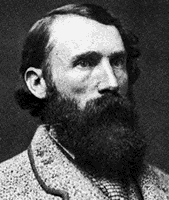
|
|
VITAL STATISTICS
|
BORN: 1825 in Culpepper, VA.
DIED: 1865 in Petersburg, VA.
CAMPAIGNS: Williamsburg, Mechanicsville, Seven Days, Gaines' Mill, Frayser's Mountain, Second Bull Run, Antietam, Fredericksburg, Chancellorsville, Gettysburg, Wilderness, Petersburg.
HIGHEST RANK ACHIEVED: Lieutenant General.
|
|
BIOGRAPHY
|
| Ambrose Powell Hill was born on November 9, 1825, in Culpeper, Virginia. He graduated from West Point in 1847, and fought in the Mexican War. He also worked for the office of the superintendent of the Coast Survey, and fought in the Third Seminole War. In March of 1861, Hill resigned from the US Army, and joined the Confederacy as colonel of the 13th Virginia Infantry. He was appointed a brigadier general on February, 1862. After fighting at Williamsburg in May, he was given command of a division, and promoted to major general on May 26, 1862. He and his troops began the Seven Days' Campaign with the Battle of Mechanicsville. Hill and his unit, known as "Hill's Light Division," also led attacks at Gaines' Mill and Frayser's Farm. Joining Maj. Gen. Thomas J. "Stonewall" Jackson, Hill's troops developed a reputation for being one of the most effective fighting units. They took part in the Battles of Cedar Mountain, Bull Run (Second), Antietam, Fredericksburg and Chancellorsville. After Maj. Gen. Jackson's death, Gen. Robert E. Lee reorganized the Confederate army, and promoted Hill to lieutenant general on May 24, 1863. He was placed in command of the III Corps, but served without distinction. Although he participated in the Battle of Gettysburg, he did not play an active role. He also took part in the Battle of Bristoe Station, but his assault caused 1,300 casualties. After serving in the Battle of the Wilderness, he became ill and had to miss the fighting at Spotsylvania. Illness again, either real or imagined, caused him to miss fighting at Petersburg. The day he returned from sick leave, Hill was shot by two Union soldiers from the VI Corps. He died the same day, on April 2, 1865, and was buried in Richmond, Virginia. |
|